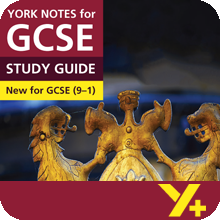Examiner's Notes
You assessed this answer as Grade 4.
Hover over the highlighted text to read the examiner’s comments.
Question: Explain the importance of youth and age in the play.
In your answer you must consider:
- how youth and age are shown
- the effect youth and age have within the play.
You must refer to the context of the play in your answer.
‘Romeo and Juliet’ is about the fate of two young lovers whose parents – the Montagues and Capulets – are enemies. The importance of youth and age is shown in the way the youth bring the family feud to an end. The younger generation of Montagues and Capulets stand for love and hope, and the older generation stand for stubbornness as they can’t get over their ‘ancient grudge’.
Youth is linked with passion. Benvolio talks about the ‘hot days’ when the ‘mad blood’ is ‘stirring’. This ‘mad blood’ is shown in the way Romeo is obsessed with Rosaline – even though his love is unrequited, which presented as a kind of madness. He switches quickly as soon as he meets Juliet – which the Friar says is typical of youth.
The play was written at a time when girls were seen as the property of their fathers and of their husbands. We see conflict between youth and age in the relationship between Capulet and his daughter. Capulet says his daughter isn’t quite fourteen years old. He says to Paris that there should be ‘two more summers’ before she is ‘ripe to be a bride’. The word ‘ripe’ makes the reader see her as a fruit that isn’t ready yet. Ironically, Juliet gets married a few days later after she falls in love with Romeo. She will die before her fourteenth birthday, and won’t see the two more summers that her father wishes for.
Later in the play, Juliet refuses to marry Paris and Capulet becomes enraged, calling her ‘young baggage’ and ‘disobedient wretch’. A woman’s role was generally seen as submissive in what was a patriarchal society. So when Juliet argues with her father it shows a youthful rebellion – which lots of readers today still understand.
The roles of the Friar and the Nurse are important when thinking about age. They act as confidantes to Romeo and Juliet. It could be argued that they are as impulsive as the young people in the way they support the secret marriage between the pair. On the other hand, the Friar agrees to the marriage because he secretly hopes it will bring the Montagues and Capulets together. In his role as mentor to Romeo, Friar Laurence shows concern about Romeo’s sudden shift in attention from Rosaline to Juliet. He says that ‘young men’s love’ lies ‘in their eyes’, suggesting there is no depth to the love experienced by the younger generation.
At the end of the play, we find out that Lady Montague died of grief when Romeo was exiled. Montague asks ‘what further woe conspires against mine age?’ suggesting that old age is a troubled time and that more and more difficulties are accumulated.
The play’s focus on the young lovers suggests that their behaviour – their passionate love and the lengths they are prepared to go to for it – is to be valued higher than the slow and belligerent attitude of the older generations.
